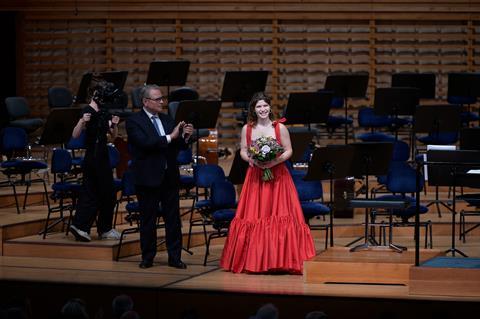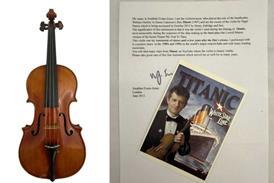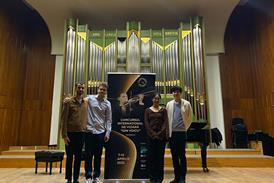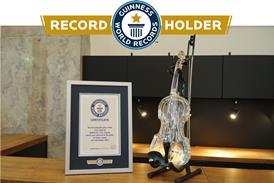US correspondent Thomas May interviews cellist Julia Hagen, winner of the 2024 UBS Young Artist Award, on the eve of her breakthrough debut with the Vienna Philharmonic at the Lucerne Festival

Discover more Featured Stories like this in The Strad Playing Hub
Over the weekend, on 7 September, Julia Hagen made a career-defining debut: As winner of the 2024 UBS Young Artist Award, the cellist was invited to perform as a soloist with the Vienna Philharmonic during its annual residency at the Lucerne Festival.
This was the 12th edition of the award (known previously as the ‘Credit Suisse Young Artist Award’), which has brought such figures as Patricia Kopatchinskaja (2002), Sol Gabetta (2004) and Vilde Frang (2012) into the international spotlight.
Conferred every two years, the UBS Young Artist Award additionally comes with a cash prize of CHF 75,000.
This marked the 29-year-old Hagen’s first time performing at the Summer Festival in Lucerne, Switzerland’s largest classical music festival; yet it was simultaneously a homecoming.
‘Just walking through the corridor earlier, the smell reminded me of the times when I was very young and would go to general rehearsals by the Lucerne Festival Orchestra under Claudio Abbado’, Hagen says.
Born in 1995 into a prominent musical family in Salzburg, Julia Hagen is the daughter of the Hagen Quartet’s cellist Clemens Hagen, who, along with her violist mother, became original members of the Lucerne Festival Orchestra when Abbado founded the ensemble in 2003.
‘My three siblings and I spent many summers here in Lucerne while my parents had their rehearsal in the afternoon. For us kids, it was the holidays. I remember feeling the special atmosphere of going to watch their rehearsals’.
Musicians no older than 30 are nominated by a panel of experts to participate in the UBS Young Artists Award. As chairman of the five-member selection committee, Michael Haefliger, Lucerne Festival’s longstanding executive and artistic director, cast his vote for Hagen.
The cellist then had to compete against the other jury members’ nominees by giving a 60-minute recital last December before the committee (which, along with Haefliger, included professor Alexander Steinberger, vice president of the Vienna Philharmonic; Stefan Pauly, director of the Society for the Friends of Music in Vienna; the music critic Dr. Peter Hagmann; and Pamela Rosenberg, director emeritus of the Berliner Philharmoniker for this edition of the award).
Hagen chose Robert Schumann’s Cello Concerto for her Vienna Philharmonic collaboration. Conducted by Christian Thielemann, the concert also included Bruckner’s Symphony No. 1 in C minor.
The Schumann proved to be an excellent platform to showcase the cellist’s expressive warmth as well as her musical intelligence. Richard Morrison in The Times praised the ‘character and assurance’ of Hagen’s playing, while Thomas Schacher wrote in Bachtrack of her ‘natural charisma and a completely natural way of handling her cello, which she treats like a part of her own body’.
Hagen shared some thoughts during an interview the evening before her big concert at the KKL Luzern Concert Hall, the festival’s main venue.
With so much professional music going on around you as a very young child, what attracted you specifically to the cello, the instrument of your father? I believe you started playing it at the age of five?
Yes. It was a mix of many reasons. I had two older siblings who played the piano and the violin, so I wanted to play something different. I apparently also liked to hide in the cello case when playing hide-and-seek — so I must have been drawn to it! But above all, it was the sound and the colours of the instrument that really attracted me. I did consider taking up the clarinet and the harp, but I started with the cello and just fell in love with it.
How did your parents’ musical interests influence you?
I grew up with the quartet repertoire, because I went to their concerts very often. I would also listen to the CDs my dad had at home. But I never studied with him, because I wanted him to just be my dad. But maybe because we had the same teacher, Heinrich Schiff, and I think also by just growing up and going to his concerts, I unconsciously picked up a lot of the same musical ideas and taste. For example, we have a very similar bow technique, since Heinrich Schiff was very picky and precise about this.
You started out learning cello with Enrico Bronzi in Salzburg and later studied with Jens Peter Maintz in Berlin. How important was Schiff as a mentor?
I only studied with Schiff for two years, and he was not in his best health anymore. But I never met a person and a musician who was so good at expressing music in words. So even though it was a very short period of two years, I think I learned the most with Schiff, because I entered his class when I was 18 and had moved to Vienna, and that was an especially important time when I was still quite flexible.
What was your reaction when you were invited to audition for the UBS award?
I was so honoured to be nominated by Michael Haefliger, because I knew how big the prize is and remembered when I was a kid and Sol Gabetta won it. For the recital I had to prepare, which lasted around 60 minutes, I wanted to show as many sides of my playing as I could. So I included music by Bach and Sofia Gubaidulina [for whose Canticle of the Sun Hagen performed the solo part at the 2023 Salzburg Festival, joined by the Los Angeles Master Chorale and other musicians led by Grant Gershon]. I also played Beethoven, Brahms, Martinů and a slow movement by Rachmaninoff. I still can’t believe that I now have the opportunity to play with the Vienna Philharmonic, which I heard so often as a student — I used to get standing room tickets. It’s doubly special, because Lucerne is also a place where I have so many connections and experienced my first concerts with an orchestra.
And you’ll be performing on your Francesco Ruggieri cello built in 1684. How did you find that instrument?
I found that instrument when I was 19 when I visited the luthier Marcel Richters in Vienna, who does also my bridges and setups. I tried some different instruments and fell in love with the Ruggieri. It had two years of restoration. When he told me the price, I told him we would not be able to buy it. But then he said: ‘Don’t worry, I’ll try to find someone to help’.
I had to go back to his atelier a week later, and a man who was trying out some bows and asked me if I could play with some of them for a couple of minutes so he could hear what they sounded like. I didn’t think anything about it, but then some time later Marcel Richters called to tell me that this gentleman, who was a hobby cellist working in science, had bought the cello for me. I never signed a contract and he’s not asking for anything. He just has many instruments that he lets young people play.
So I’m extremely grateful to him, because I can play this instrument that has so many different colours. I think it speaks very well. The cello is famous for singing, but for me it’s also very important to be able to speak and not just sing. It has so many beautiful overtones.
The Schumann Cello Concerto is a very interesting choice. What’s your relationship with that work?
My first choice was originally the Dvořák concerto, but it had already been programmed for earlier in the festival. I know that Thielemann loves the Schumann — I think it’s the one he has played the most — and I love his way of approaching it.
With that concerto especially, if the approach differs just a little bit, it can turn out to be not as satisfying. Sometimes it feels like playing Bach, because opinions about what is right are so extreme.
It’s such a personal piece to me. It’s the first concerto I played in Asia and also the concerto I played for my master’s exam. So I have many memories in connection with the Schumann concerto. There’s another family story here, too: when I was 14, my dad had to jump in for the pianist Radu Lupu at the Salzburg Festival, and they decided to do the Schumann Concerto instead, with Franz Welser-Möst conducting the Vienna Philharmonic. I remember exactly how excited I felt listening to him and the Vienna Philharmonic doing that concerto. So now, 15 years later, I get to play the same piece with that orchestra.
What’s special about the Schumann for you?
What’s really special is that it changes character every two seconds. [She sings the opening theme.] You have to be so quick to change and show the inner emotions. That’s why I love it so much. But it’s also really tricky because it’s so delicate. Everything is written so pianistically, so it’s really difficult. But if you think about technique, I think the music won’t touch you because it lives off these quick changes of emotions. It’s really demanding and tiring but worth it.
We had one rehearsal together in Vienna with the orchestra and Thielemann a couple of days ago, and I never enjoyed the Schumann Concerto as much as I did in that rehearsal. He made me feel so safe and secure. The specialty of the Vienna Philharmonic is that they’re so flexible because of all the opera they play; they react so quickly. And this is a concerto that gives you so much freedom. The challenge for me is to find the right amount of freedom to show all those emotions, while also trying to not forget the tempo markings. I’ve learned to find a balance between taking care of what Schumann actually writes but also give the music the freedom it needs — as with Bach, the right balance between structure and freedom.
Read: Joshua Bell and Steven Isserlis on their passion for Mendelssohn
Listen: The Strad Podcast: Exploring resources and finding your teaching style with cellist Guy Johnston
The number one source for playing and teaching books, guides, CDs, calendars and back issues of the magazine.
In The Best of Technique you’ll discover the top playing tips of the world’s leading string players and teachers. It’s packed full of exercises for students, plus examples from the standard repertoire to show you how to integrate the technique into your playing.
The Strad’s Masterclass series brings together the finest string players with some of the greatest string works ever written. Always one of our most popular sections, Masterclass has been an invaluable aid to aspiring soloists, chamber musicians and string teachers since the 1990s.
The Canada Council of the Arts’ Musical Instrument Bank is 40 years old in 2025. This year’s calendar celebrates some its treasures, including four instruments by Antonio Stradivari and priceless works by Montagnana, Gagliano, Pressenda and David Tecchler.






































No comments yet